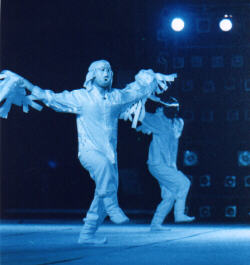
"Pojagi" by Ping Chong, a poetic documentary on Korea
from the 16th century to today
Prominent director of the avant-garde completes his East-West Series.

| |
|
C.S. Lee, Esther Chae in "Pojagi" photo by Dae-Hyun Cho |
|
La MaMa E.T.C. (Annex Theater), 74A East Fourth Street
Presented by La MaMa E.T.C.
Wed-Sat at 8:00 pm, Sun at 3:30 pm and 8:00 pm; Fri & Sat $25/tdf; W, Th & Sun $20/tdf
(212) 475-7710 "Pojagi" by Ping Chong is a prismatic exploration of Korean history from the 16th to the 20th century, focusing particularly on relations with Japan and the United States. The play is the fourth part of Ping Chong's East-West series, which deals with the history between Asian cultures and the West and includes "Deshima" (La MaMa, 1993), "Chinoiserie" (BAM, 1995), and "After Sorrow" (La MaMa, 1997).
Taking the form of a poetic documentary, "Pojagi" is comprised of a series of scenes and monologues drawn from historical sources revealing a portrait of the under-soul of modern Korea. Included are eyewitness testimonies of early encounters between Europeans and Koreans, Japanese invasions through the years, the assassination of Korea's Queen Min, the arbitrary partition on the peninsula at the dawn of the Cold War and reflections on the delicate ecosystem of the demilitarized zone. At times, it seems to be written from the Korean perspective; at other times, it is thoroughly from the eye of an outsider. This is in keeping with the bulk of Ping Chong's East-West series, which dealt with Japan in "Deshima," China in "Chinoiserie" and Vietnam in "After Sorrow."
The narrative is supported by choreography and music from the Korean shamanistic tradition. The title, "Pojagi," is the Korean word for a traditional wrapping cloth or bindle.
The cast of four is headed by a man (C.S. Lee) and a woman (Esther Chae) who serve as narrators. The stage picture is a study in minimalism, with a raised platform upon which molds are reconfigured scene-by-scene. From this simple surround, images from Korea's history burst from the text and cling in the mind with surprising authenticity. These include early impressions of the Korean people by shipwrecked European explorers, the murder of the Korean Empress by Japanese invaders in 1895 and the verdant, delicate wildlife preserve which generated itself spontaneously on the five-mile minestrip separating North and South Korea today.
The production was developed and presented as a work-in-progress during a residency at the Harvard University Institute on the Arts and Civic Dialogue in the summer of 1999 with the support of the National Endowment for the Arts and the Rockefeller Foundation. It was presented at the DMZ 2000 Festival in South Korea on New Year's Eve, 1999.
This is the fifteenth premiere by Ping Chong at La MaMa, which has been his theatrical home since it produced his Obie-winning "Humboldt's Current" in 1977. His "Kwaidan" (La MaMa, 1998), a puppet work which dramatized Japanese fairy tales, was widely considered the outstanding production of the that year's International Festival of Puppet Theater and was voted the number one production of the 1998-99 season by critics of the New York Theatre Wire. Also last season, Ping Chong received a 1999 Bessie Award for "Slutforart," a piece he created for choreographer/dancer Muna Tseng as a sequel to their 1997 La MaMa collaboration, "After Sorrow."
Ping Chong was born in Toronto and raised in New York City's Chinatown and is now considered one of the foremost directors of American performance art. La MaMa has premiered Ping Chong's "Nuit Blanche" (1981, 1985), "Anna into Nightlight" (1982), "A Race" (1984), "Nosferatu" (1985, 1991), "Kind Ness" (1986), "Skin A State of Being" (1989), "Brightness" (1989; two Bessie Awards, 1990), "Elephant Memories" (1991), "Deshima" (1993), "Interfacing Joan" (1996) and "After Sorrow" (1997). Ping Chong's awards also include an Obie Award, five National Endowment for the Arts Fellowships, a Playwrights' USA Award, a Guggenheim Fellowship, two McKnight Playwriting Fellowships, a TCG Pew Charitable Trust Fellowship and a 1992 Bessie Award for Sustained Achievement. Altogether, he has created over 27 works for the stage, seven visual arts installations and three videos. His work has been presented at major museums, festivals and theaters throughout the Americas, Europe and Asia.
"Pojagi" is written and directed by Ping Chong. The performers are Esther Chae and C.S. Lee as the narrators, supported by Shin Young Lee and Sunyoung Park. Choreography is by Sunyoung Park. Set design is by Watoku Ueno. Lighting is by Darren McCroom. Sound design is by Brian Hallas. Costume design is by Stefani Mar.
La MaMa, in association with NYU’s Asian/Pacific/Americans Studies Program (where Ping Chong is Artist-in-Residence), will sponsor post-performance discussions with Korean artists and scholars March 2 and 3. Ping Chong will discuss issues raised in the play with Korean American novelist Chang-Rae Lee, author of "Native Speaker," on March 2 and with noted historian Bruce Cumings, author of "Korea's Place in the Sun: a Modern History," on March 3. [NYTW]
Related article: La MaMa sets 1999-2000 season schedule
| home |
listings |
columnists |
reviews |
what's new? |
cue-to-cue |
people page |
welcome |
| museums |
recordings |
what's cool? |
who's hot? |
coupons |
publications |
classified |